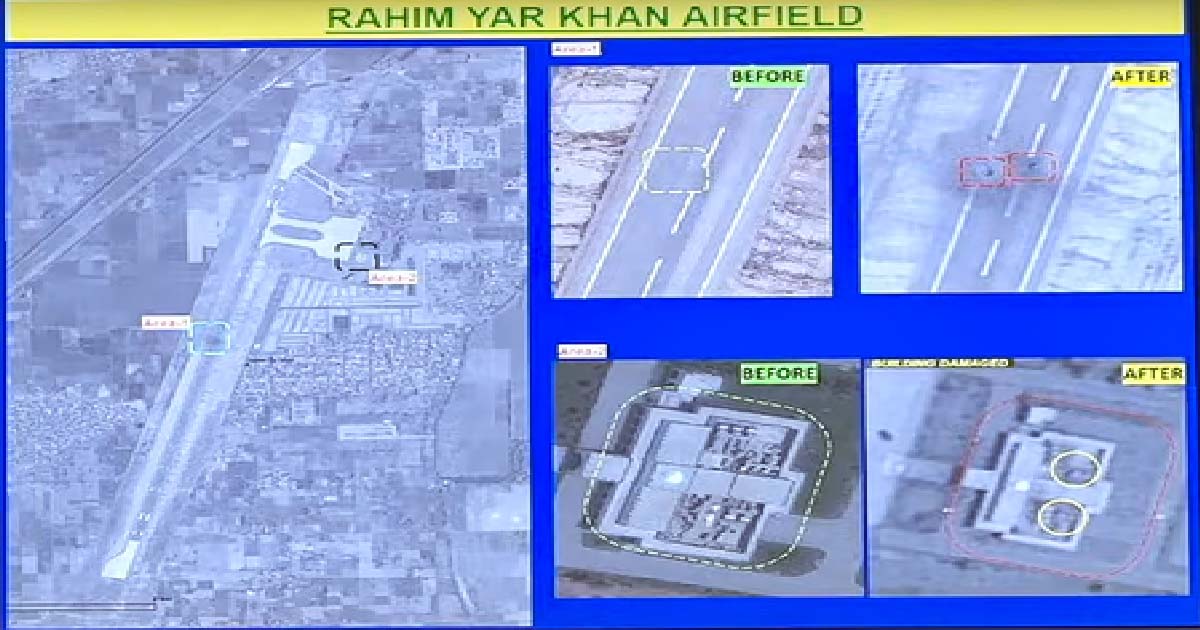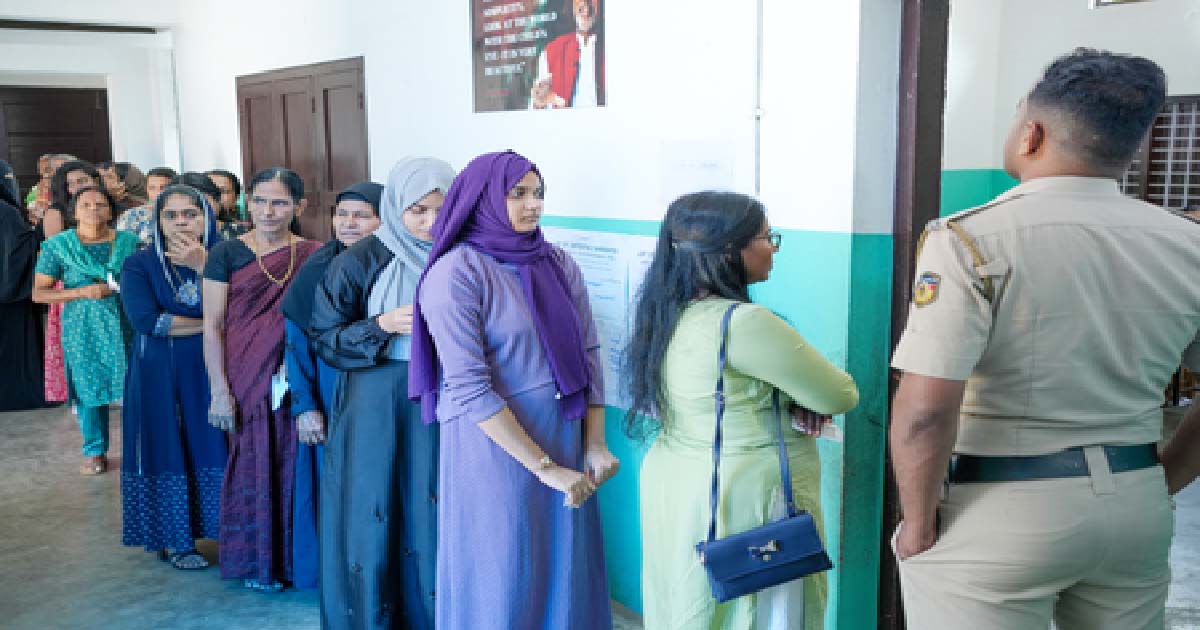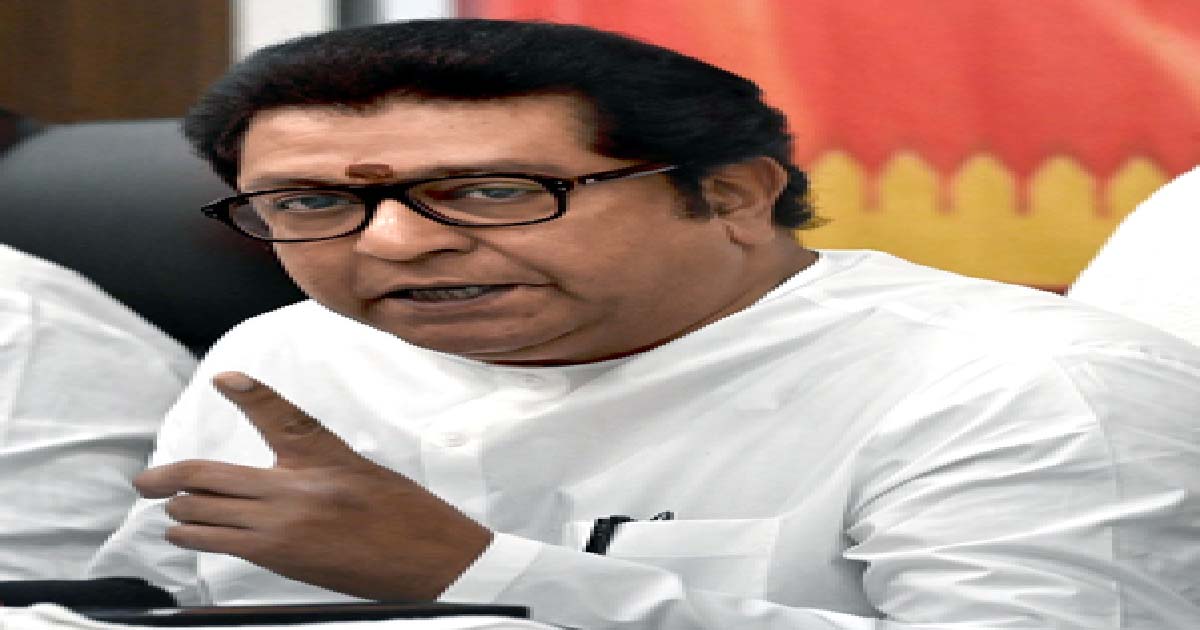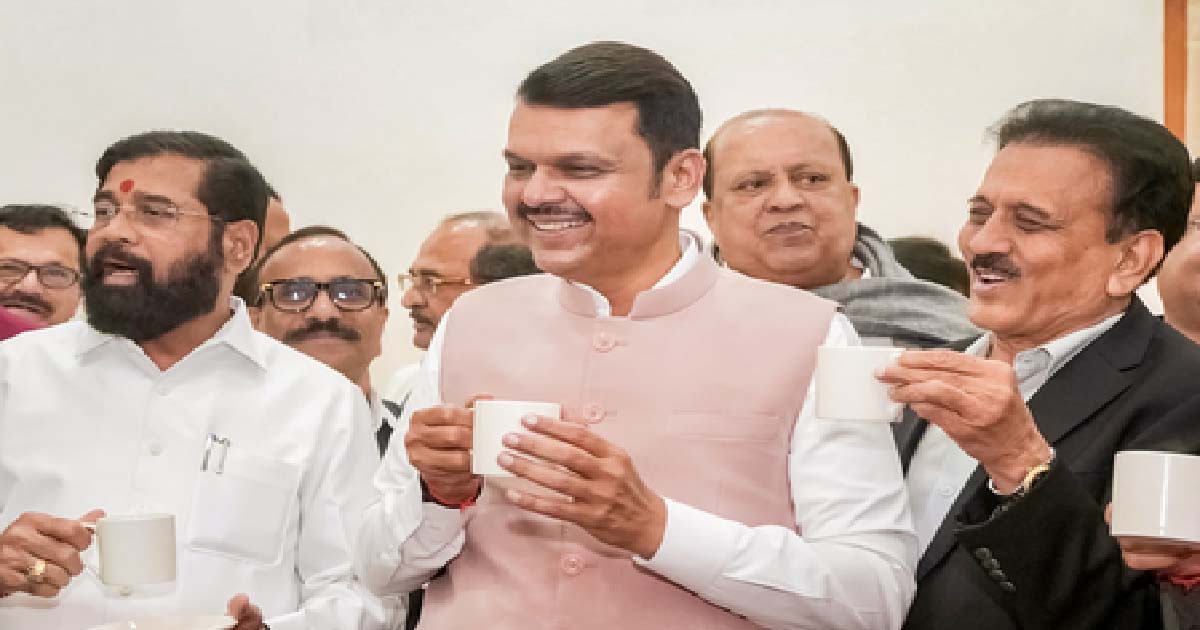National News
Surviving India’s wrath: Tough road ahead for Pakistan

New Delhi, May 12: The half-burnt portrait of Asif Ali Zardari from the smouldering debris of Rahimyar Khan air base is a symbolic devastation of the image of Pakistan as Operation Sindoor marked a significant demonstration of India’s military and strategic prowess through a blend of military and non-military means.
The extent of Pakistan being punished through both means is now quite clear.
The multi-dimensional operation successfully neutralized terrorist threats, deterred Pakistani aggression, and reinforced India’s zero-tolerance policy toward terrorism, all while maintaining strategic restraint and international support.
As far as the military measures are concerned, India employed a range of precise and deliberate military actions to achieve its objectives.
The Indian Armed Forces carried out coordinated precision missile strikes on nine terrorist facilities—four in Pakistan (including Bahawalpur and Muridke) and five in Pakistan-occupied Kashmir (such as Muzaffarabad and Kotli). These facilities were key command centers for Jaish-e-Mohammed (JeM) and Lashkar-e-Taiba (LeT), responsible for attacks like Pulwama (2019) and Mumbai (2008).
In response to Pakistan’s retaliatory drone and missile attacks from May 7-9 that targetted multiple Indian cities and military installations, India launched kamikaze drones to destroy Pakistani air defences across the country, including neutralising the air defence system of Lahore.
India’s air defence system proved instrumental in neutralising all incoming threats, resulting in near zero casualties or material losses, and exposing flaws in Pakistan’s HQ-9 system. The counter military actions on the night of May 9 and 10 also became the first instance of a country damaging air force camps of a nuclear country.
Within three hours, 11 bases were attacked including Nur Khan, Rafiqui, Murid, Sukkur, Sialkot, Pasrur, Chunian, Sargodha, Skardu, Bholari and Jacobabad.
The scale of destruction was clearly visible in the before and after photos of Shahbaz airbase at Jacobabad.
In the strikes, various ammunition depots and bases like Sargodha and Bholari that housed F-16s and JF-17 fighter jets were hit. This led to destruction of 20 per cent infrastructure of Pakistan’s air force.
India bombed Pakistan’s Bholari Air Base, killing over 50 people including Pakistan’s squadron leader Usman Yousuf, four airmen among others as well as destroying Pakistan’s fighter jets.
Over the course of Operation Sindoor, multiple terror and military locations across Pakistan were attacked by India. Along the LoC, following Pakistani artillery and mortar shelling in the Poonch-Rajouri sector that targetted civilian areas, Indian troops responded with calibrated counterfire destroying terrorist bunkers and Pakistani army’s positions to target civilians.
When it comes to the non-military measures, India’s non-kinetic efforts were equally significant in shaping the strategic environment and ensuring public and international support. India leveraged strategic policy decisions, information dominance, and psychological operations to isolate Pakistan economically and diplomatically, while bolstering domestic readiness and international support.
India’s suspension of the Indus Waters Treaty (IWT) under Operation Sindoor was a decisive move with far-reaching consequences. Pakistan, as the lower riparian, depends on the Indus system for 80 per cent of its 16 million hectares of farmland and 93 per cent of its total water use — sustaining 237 million people and driving a quarter of its GDP through crops like wheat, rice, and cotton.
With just 10 per cent live storage capacity (14.4 MAF) at Mangla and Tarbela dams, any disruption in flows threatens catastrophic agricultural losses, food shortages, water rationing in major cities, and rolling blackouts that would cripple industries, including textiles and fertilizers. These shocks could trigger a broader fiscal and foreign exchange crisis in an already fragile economy.
For India, the treaty had long constrained infrastructure development in Jammu and Kashmir, limiting it to run-of-the-river projects. Its suspension allows India full control over western rivers like Jhelum and Chenab — enabling new reservoirs, boosting irrigation and hydropower in Jammu and Kashmir, Ladakh, Punjab, and Haryana, and transforming a diplomatic tool into a developmental advantage.
By suspending this, India gave decisive message that water and blood cannot flow together.
India closed the Attari-Wagah border and suspended all bilateral trade with Pakistan, halting exports of key goods such as onions and restricting imports like cement and textiles. This decision severed the primary land-based trade route between the two countries.
The suspension imposed immediate economic costs on Pakistan, already grappling with inflation and debt. By choking off these economic lifelines without engaging in direct military escalation, India reinforced its zero-tolerance stance while avoiding full-scale conflict.
India also cancelled the visas of all Pakistanis living in India and sent them back in the immediate aftermath of the April 22 Pahalgam terrorist attack showing strong resolve against terrorism. The imposition of a complete ban on Pakistani artists, halting performances, screenings, music releases, and cultural collaborations also extended to streaming platforms, cutting off Pakistan’s cultural influence in India.
India exposed Pakistan’s terror ecosystem globally and isolated Pakistan diplomatically. These steps imposed tangible economic and diplomatic costs. Collectively, these actions deepened Pakistan’s isolation and reaffirmed India’s commitment to a zero-tolerance stance on terrorism.
National News
‘Victory for democracy’: Congress candidate Vaishnav Suresh on Kerala local body poll win after legal battle

Thiruvananthapuram Dec 13: Congress candidate Vaishnav Suresh on Saturday described her victory in the Kerala local polls as “a triumph of democracy and truth”, days after her candidature, initially rejected by the authorities, was restored following the intervention of the Kerala High Court.
Suresh defeated sitting Thiruvananthapuram Corporation councillor Amshu Vamadevan, who shifted from his original seat to contest the Muttada seat but lost to the first-timer.
The Muttada seat, since its inception, was a citadel of the CPI-M.
Soon after the early results indicated her victory, Vaishnav said she was “very happy” and termed the outcome a clear message from the people.
“This is a victory for democracy. Truth will always triumph, and it has done so here. People knew what was happening,” she said, adding that she had “fought a good fight”.
Vaishnav’s candidature had attracted statewide attention after her nomination papers were rejected during scrutiny on technical grounds.
The decision triggered protests from the Congress, which alleged unfair treatment and claimed the rejection was politically motivated.
Vaishnav subsequently approached the High Court, which, after hearing her plea, ordered the authorities to accept her nomination, allowing her to re-enter the fray.
The legal battle, coupled with her young age, turned Vaishnav into a prominent face of the Congress campaign in the constituency.
Party leaders projected her case as an example of institutional injustice and rallied support around what they described as a fight to protect democratic rights.
Her campaign, which resumed after the court order, focused on governance issues as well as the larger theme of safeguarding democratic processes.
Political observers note that the verdict in her favour is significant not just for the Congress, but also in the broader context of the local body elections, where procedural disputes and legal challenges featured prominently in several places.
Vaishnav’s win is being seen as a morale booster for the Congress, particularly among youth and first-time candidates.
Congress leaders welcomed the result, stating that it reaffirmed public faith in both the judiciary and the electoral process.
They also credited voters for “seeing through attempts to deny a candidate her legitimate right to contest”.
For Vaishnav, the victory marks the beginning of her political journey under intense public scrutiny.
Reiterating her commitment to the electorate, she said she would work to justify the trust placed in her and focus on addressing local issues.
“This mandate belongs to the people who stood by me,” she said, signalling that the fight, though won at the ballot box, was only the first step in public life.
National News
Raj Thackeray flags rise in child abductions in Maharashtra, calls for action by CM Fadnavis

Nagpur, Dec 13: Maharashtra Navnirman Sena chief Raj Thackeray on Saturday expressed serious concern over the rising incidents of child abduction and missing children in Maharashtra, urging Chief Minister Devendra Fadnavis to take concrete and immediate action.
In a post on X, Thackeray cited National Crime Records Bureau data to underline the scale of the problem.
“According to NCRB data, even if we look at recent years, this rate has increased by nearly 30 per cent from 2021 to 2024. Interstate gangs have emerged that abduct young children and then force them into labour or push them into begging on the streets. These gangs are brazenly abducting very young children, and it is unclear what exactly the government is doing about it,” he said.
Thackeray said mere statistics offered little reassurance to families. “We in Maharashtra do not want a government response along the lines of, ‘So many cases of child abduction have been registered, and X per cent of those children have been traced and safely returned to their families.’ Fundamentally, the figures reported by the NCRB only show how many parents have filed complaints with the police. But do even a few thousand such complaints actually reach the police in the first place?” he asked.
He also raised concerns about the long-term impact on rescued children. “Even if a child is somehow rescued and returned, what about the trauma inflicted on their minds during that time? More importantly, how are these child-abducting gangs allowed to operate at all, and how do they carry out their activities so boldly and without fear?” Thackeray said.
Questioning the government’s resolve, the MNS chief asked whether there was any urgency to deal with the issue. “When we see young children begging on the streets, at railway stations, or at bus stands, who are they? Are the adults begging alongside them really their parents? Should the government not issue orders for investigations or, if necessary, even conduct DNA tests?” he asked.
The MNS chief further said that in the state today, young children and girls were being abducted and land in Maharashtra was being usurped, and asked whether these issues should not be discussed in the legislature with the administration compelled to take unanimous steps.
Referring to the winter session of the Assembly, he criticised what he described as a lack of seriousness. “Is the winter session only meant to clear supplementary demands to cover up faulty budget estimates? Very often, ministers are absent when answers are required. It almost feels unreasonable to expect discussions on issues like missing children or abducted girls. But this is what Maharashtra expects,” he said.
Thackeray also suggested a coordinated national approach. “Ideally, the central government should discuss this with all states and form task forces. But it does not appear likely that a central government busy with heated debates over ‘Vande Mataram’ will hear the anguish of mothers,” he said.
Addressing Fadnavis directly, he added, “As the Chief Minister and Home Minister of the state, we expect you not only to facilitate a discussion on this during the session but also to take concrete action.”
National News
Marathi people denied housing in Mumbai, status reduced to that of a ‘doormat’: Saamana editorial

Nagpur, Dec 13: Maharashtra’s opposition, Shiv Sena-Uddhav Balasaheb Thackeray (UBT), on Saturday alleged that the rights and interests of the Marathi people are being undermined by the government, led by Chief Minister Devendra Fadnavis and Deputy Chief Minister Eknath Shinde.
“The Fadnavis-Shinde government has reduced the Marathi people’s status to that of a ‘doormat’ and is now applying the balm of ‘Pagdi-mukta’ (Pagdi-free) Mumbai. This is hypocrisy. The real problem in Mumbai is that Marathi people are denied housing, and (Union Home Minister Amit) Shah, Shinde, Fadnavis and some cronies are the masterminds behind this,” it said in a hard-hitting editorial in the party mouthpiece ‘Saamana’.
It targeted DCM Shinde over his announcement of Mumbai to be made pagadi-free through a separate set of rules for the proper and fair redevelopment of old buildings under the pagadi system (a form of tenancy), which is claimed to benefit over 19,000 such buildings. Further, he had announced to grant “amnesty” to buildings without an Occupancy Certificate (OC), redevelop chawls on mill lands, and housing for police. There are reportedly 20,000 OC-less buildings in Mumbai, the editorial said, questioning how much of this will benefit the original residents of Mumbai— “the Marathi Manoos” or the sons of the soil.
The editorial also highlighted the “hypocrisy”, noting that in Shinde’s own Thane district, hundreds of Marathi families were rendered homeless after bulldozers razed many OC-less buildings, an outcry that went ignored.
“The amnesty in Mumbai is a move aimed solely at winning votes. These announcements were made when flood-affected farmers in Marathwada are reportedly not receiving aid, and 6.5 lakh farmers are deprived of the Samman Yojana, requiring Rs 5,975 crore in necessary funds. Further, all these announcements were made while the municipal elections are expected to be announced within the next 72 hours,” it said.
The Thackeray camp claimed that the recent announcements made by CM Fadnavis and DCM Shinde are with an eye on the upcoming elections to the BrihanMumbai Municipal Corporation and other civic bodies in the state, and are nothing but “old wine in a new bottle”. The overall strategy is to use money to fight elections and shower people with popular announcements to deceive them, it said.
It highlighted the alleged discrimination against Marathi people in Mumbai’s housing societies, claiming that in areas like Mira-Bhayandar and Mumbai, some builders have reportedly displayed boards on societies stating: “Only Marwadi-Jain will get homes here”, and that the BJP and RSS-affiliated people claim the primary language of Ghatkopar is Gujarati.
The Thackeray camp also claimed that Shinde and his associates have hatched a plan to snatch Mumbai from the hands of the Marathi people and present it as a gift to Home Minister Amit Shah, urging the Marathi people to be extremely careful. “A senior minister in the Maharashtra Cabinet reportedly stated during a legislature session that the BJP has a plan to divide Maharashtra, and Chief Minister Fadnavis is working on it. The individuals who call themselves ‘Shivsena’ (referring to the Shinde faction) are cowardly soldiers who remain silent, neglecting the state’s welfare. The moves to snatch Mumbai are part of these tactics,” the editorial said.
The Saamana editorial also said that the Chief Minister is said to have sanctioned a massive Rs 32,523 crore fund for various development projects across the Pune Metropolitan Area, encompassing 220 projects. “This rush of announcements is taking place despite the Chief Minister’s alleged admission of an economic emergency in the state, which is burdened with a debt of approximately Rs 9.5 lakh crore accrued under the Fadnavis-Shinde government.
-

 Crime3 years ago
Crime3 years agoClass 10 student jumps to death in Jaipur
-

 Maharashtra1 year ago
Maharashtra1 year agoMumbai Local Train Update: Central Railway’s New Timetable Comes Into Effect; Check Full List Of Revised Timings & Stations
-

 Maharashtra1 year ago
Maharashtra1 year agoMumbai To Go Toll-Free Tonight! Maharashtra Govt Announces Complete Toll Waiver For Light Motor Vehicles At All 5 Entry Points Of City
-

 Maharashtra1 year ago
Maharashtra1 year agoFalse photo of Imtiaz Jaleel’s rally, exposing the fooling conspiracy
-

 National News1 year ago
National News1 year agoMinistry of Railways rolls out Special Drive 4.0 with focus on digitisation, cleanliness, inclusiveness and grievance redressal
-

 Maharashtra1 year ago
Maharashtra1 year agoMaharashtra Elections 2024: Mumbai Metro & BEST Services Extended Till Midnight On Voting Day
-

 National News1 year ago
National News1 year agoJ&K: 4 Jawans Killed, 28 Injured After Bus Carrying BSF Personnel For Poll Duty Falls Into Gorge In Budgam; Terrifying Visuals Surface
-

 Crime1 year ago
Crime1 year agoBaba Siddique Murder: Mumbai Police Unable To Get Lawrence Bishnoi Custody Due To Home Ministry Order, Says Report












